#i love me some meta commentary
Text
I can't think about Danganronpa V3's ending without connecting it to this dialogue from the ending of Funny Games (2007), so uh spoilers for that movie if it matters.
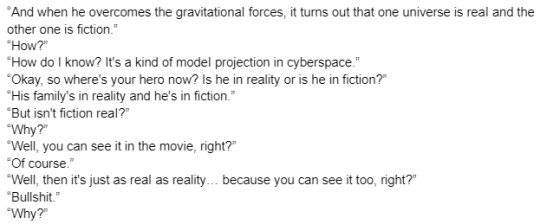
V3 and Funny Games should hold hands and spin in a circle together
5 notes
·
View notes
Text
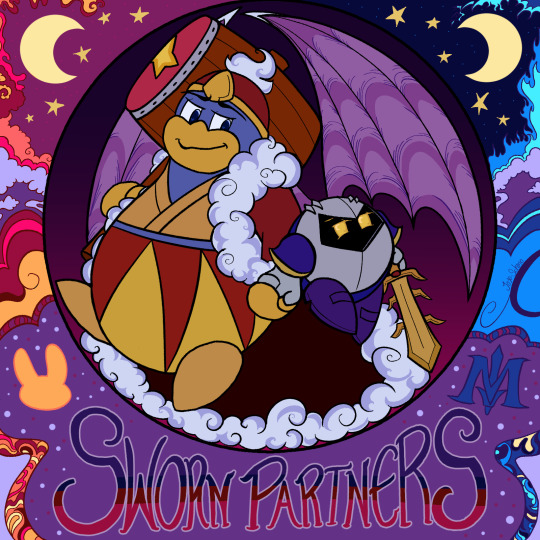
Metadede Week Day 1: "Sworn Partners"
#I just wanted to make another 70s album cover!!#And fill it with detail and just have some fun!#Like for example#Dedede's waning crescent and Meta's waxing crescent on their respective sides#...and highlighting their eyes with each other's crescent symbols teeheehee#thinking in color is usually very hard for me so this was a really fun exercise#the trick to these swirly album covers is to just loosen up and try to take a walk with each line#it's great fun! kinda like zentangle but even less structured#anyway thanks for reading my director's commentary#i love these two so very much :)#king dedede#meta knight#art#metadede#mtddweek2023#kirby fighters 2
375 notes
·
View notes
Text
Modu by priest was truly such a good read. If you like romance? It has a sweeping romance, with a well done bisexual and gay lead (and straight best friend) all written in ways that manage to feel realistic, it's got features people likely found it for when looking for a danmei - rich manipulative younger man, older investigator who's got a hero streak, and yet those categories don't really do justice to them (and of course tao ran is the more grounded detective story lead who keeps his theories to himself and worries about dragging others into his mess).
They're so much more... Fei Du is a traumatized young man who's worried he's as monstrous as the people who scarred him, who is preparing to take the leap and cross the line to become an even more terrifying version of himself if it will destroy the corruption poisoning this city and harming so many, Luo Wenzhou is a cop that used to want to be a hero and learned he will fail people and be unable to save people and holds onto Fei Du as someone who reminds him he DOES fail but also reminds him why he wants so hard to keep Trying to help people even when it seems impossible... why trying and putting in effort to care and help Even when its too late to fix things is Worthwhile. Tao Ran is a contrast to them both, Fei Du living in a world where there's only monsters and victims and Luo Wenzhou desperately trying to force the world to be a place where justice CAN prevail and win even as he sees it fail over and over, trying so hard to believe all people have the capacity for everything and are worth trying to save. Even though Fei Du doesm't believe that, being around Luo Wenzhou makes him want to consider it. Tao Ran, their contrast? Believing the world can go either way, and its up to people like him to create any justice at all, any structure at all, or else everything is just meaningless suffering chaos. As characters, the three of them serve to explore how the world works and views on it in terms of a detective murder mystery encompassing the whole city, the small scale version of the world. Modu is a romance, but its also fully commited to being a murder mystery that wants to tackle the kind of themes that come up in the setting it's created. Its characters are so much more than Insert Character Ship types here. These characters were made this way to explore these ideas (just as the villains are all made to parallel and contrast Fei Du to explord these ideas in comparison to our point of view Fei Du moments, our impressions of Fei Du from Luo Wenzhou and Tao Rans varied perspectives, all of them are different lenses to view humanity and how it works, if the world is just or if we have to make it good, if we can be inherently good and if good people will reach out to us if we just keep treading water to survive, if its luck and chaos, and how much... and much more frankly).
Modu is like. If you want a story about a corrupt city and its victims, symbolizing a corrupt world and all of us at its mercy, and you want to see the heart of the people doing something about it. First the main trio, but also every victim Fei Du recruits to help, every murderer recruited to the corruption, all the people in the cases swayed to some side. Thats what Modu is about.
The romance is just one facet of exploring that, the personal debate about what these things mean about the world as told through two people who view this world incredibly differently. Yet find some way to exist in the same space, same mutual world, when together. It hooks you in and doesn't let you go and youre wondering right there with them, left to draw your own meaning in the end. Hopefully that its worth trying, that doing something is worth trying even when its just the trying you can do and not the succeeding, at least thats what I got from it (at least in regards to Fei Du and Luo Wenzhou meeting each other, unable to live up to the pillar they put each other on but trying anyway, is what I felt from them).
Then like? Modu gives you THAT story, which in its own right is enough to make you contemplate.
And if you're like me and care about people, about characters? Well it gives you, like I said, those big themes and a city's nightmares symbolizing the world, and brings them down to an individual level. You read from the mind of the little girl who grew up in this (one of my favorite scenes and when I felt this novel was going to not shy away from dark psychological moments and bringing them to you). You read from the mind of Fei Du when he knows himself, when he doesn't. You read from the minds of all kinds of people, and the heart of much of the investigation is peoples motives and things they'd gone through and how that shaped what they'd do next. Why they'd do it. Leaving you to wonder who's right. Jaded idealist Luo Wenzhou who wants to believe in the goodness of the people he loves, but also is willing to risk that strangers may have good intent? Fei Du who thinks theres only victims and perpetrators and everyone is going to fall into one in the right circumstance? Tao Ran, who feels the world is too messy to dare declare predictable, who thinks even your closest can betray you and even you can accidentally hurt them, nevermind strangers, and the only thing you can control and rely on is your own choices? Some mix? None of them? The side characters as they come up, grow and evolve, do they understand the world better or worse, and is the world they experience different than anothers and justify why their worldview is likewise different? Modu gives you that up close and personal, over and over. Im still thinking about it. And the way its done, they all get to feel like lived in people. Not structures to tell the themes only. But on their own, there's a personal struggle between Fei Du feeling like a monster who'll destroy Lup Wenzhou if he loves him, like his dad destroyed his mom, and Luo Wenzhou carrying the guilt he could never save Fei Du and desperate to believe in Fei Du (and keep trying to save him in that way if only that way) as person who can do good despite not being saved and despite Fei Du's fears. You could cut the entire city's plot away, all of the crimes and make the city calm, and still that core of their plot would be carrying a Lot of weight. Theyre playing a game of "enemies" to lovers sure, or whatever romance story structures they fit into. But they're also made to be deeply rooted into each other, their personal beliefs tied into the outcome of what they hope or fear happens if they are close together. Modu made me care about that. Its like the fears many people might have, abiut theur own flaws, about getting close to others, about trusting and being unsure if that trust is safe to give. Its that and magnified into bigger form, in this landscape of a fucked up city and the tragedy of Fei Du and Luo Wenzhou's meeting and former lives.
Its like. Id love to to read another danmei (Ive got a lot on my to read list). But what's going to give me roo
#modu#silent reading#lb#meta#like... modu was so fucking good.#it was 3 characters symbolizing their city symbolizing the world in terms of worldviews morality justice and if theres a point to#trying to help at all. like damn#i want to read ANOTHER danmei that makes me weigh those questions. that uses the characters this personally and intimately with the readers#because the Characters weigh the themes in their OWN lives so heavily.#like... i know priest can probably give me this kind of huge delivery in can ci pin and sha po lang (at least i estimate#priesr probably can as theyre very popular novels by priest)#and 2ha can (because ive read half and know its themes)#but like. what other danmei can? can thousand autumns? can peerless? can wu shang jie?#can Mistakenly Saving the Villain?#like... the only non priest danmei i read was svsss and i got supremely lucky#cause i personally LOVE satire and critique commentary affection for the topics it explores#and svsss AS a satire is incredibly well done. having read 2ha first? and seen Eternal Love?#svsss does an amazing job at critiquing webnovel culture and flaws. at the way capitalism effects writing#at the way some tropes have become staples of certain genres and when used well yeah you get 2ha but when used badly you get#the fake novel svsss was making fun of that there Are many real novels like
63 notes
·
View notes
Text
Péi nǐ dào shìjiè zhī diān (Gank Your Heart)
WANG YIBO as Ji XiangKong (2019)
See the OST photoshoot
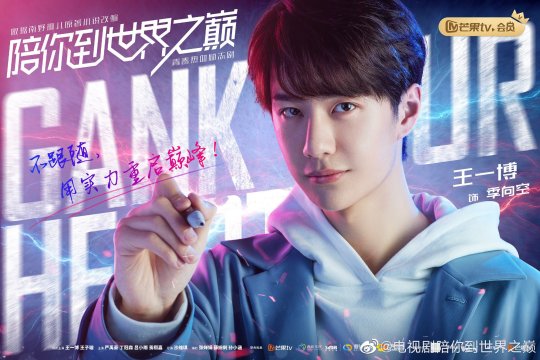






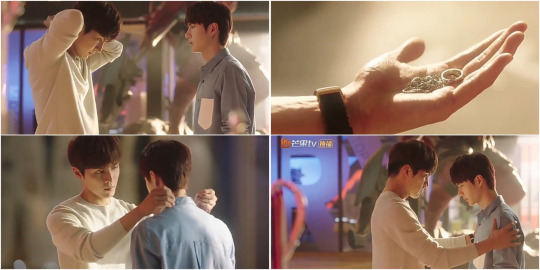



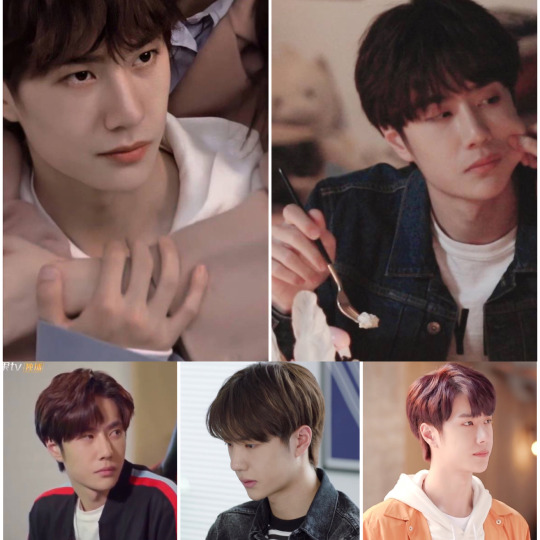


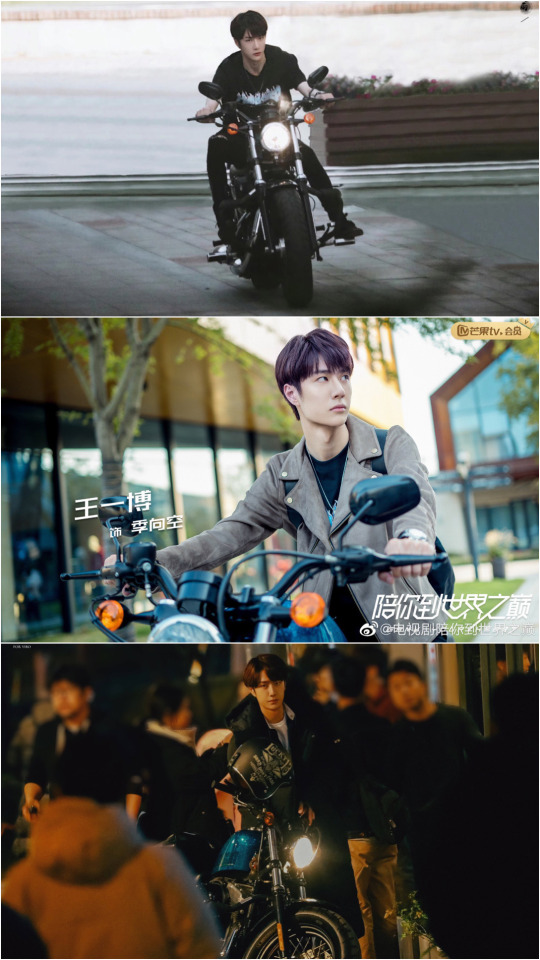
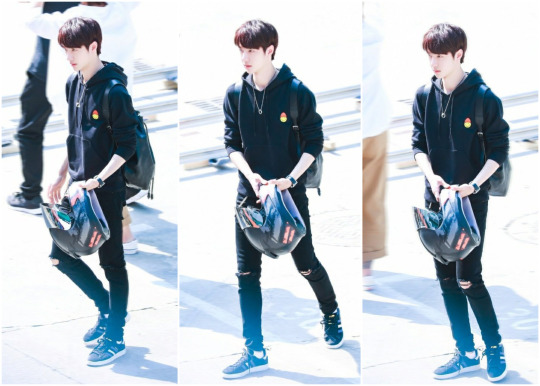
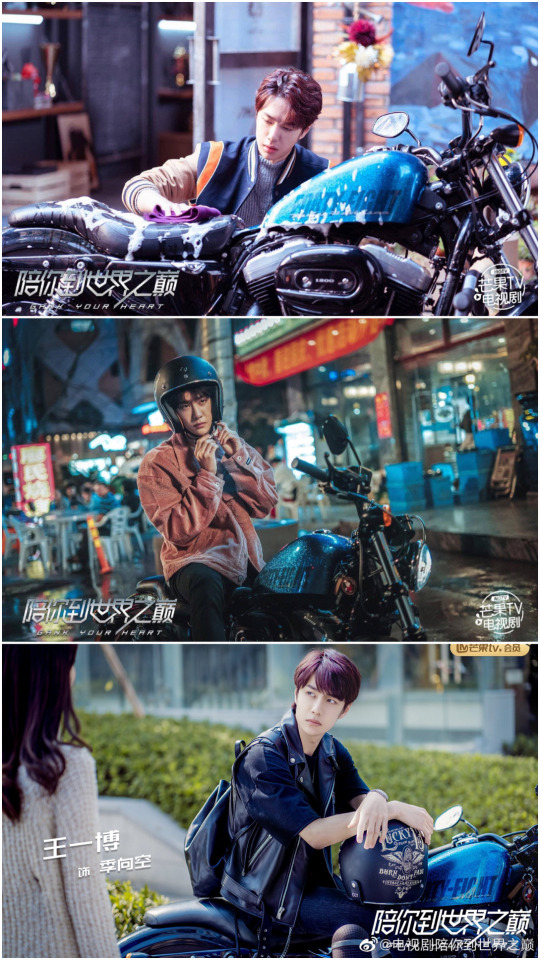

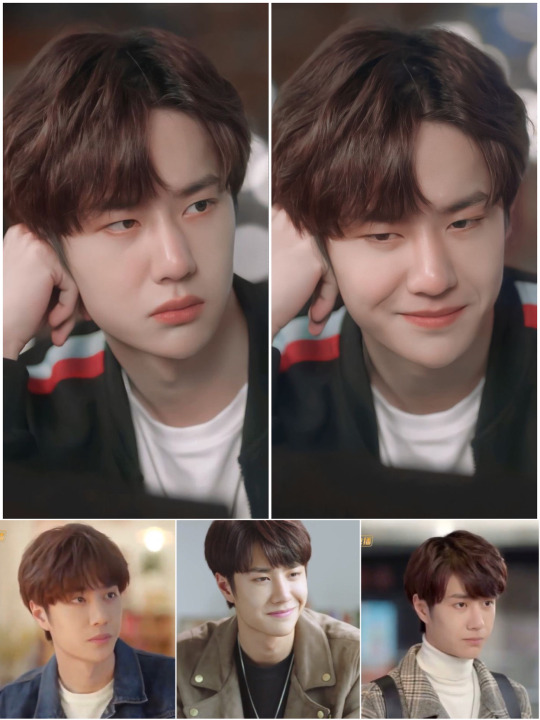
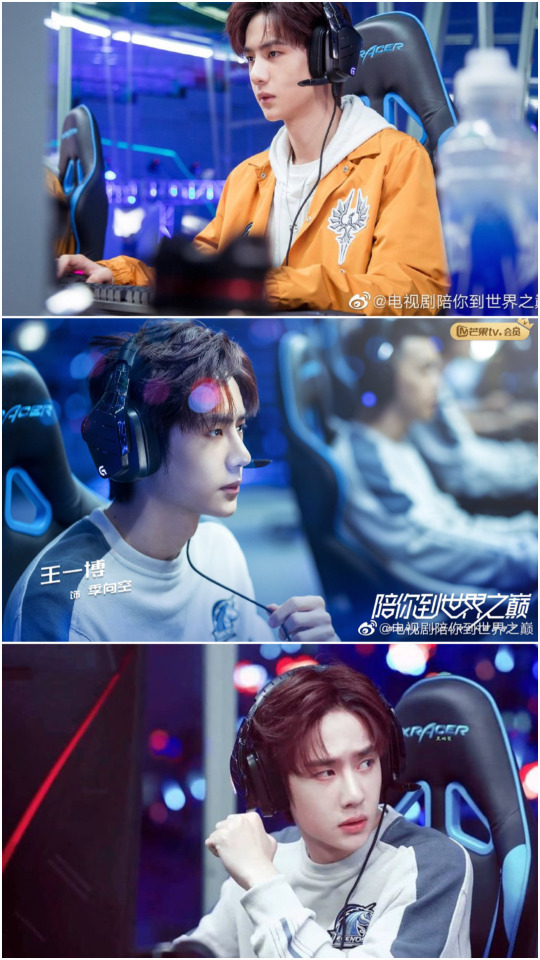
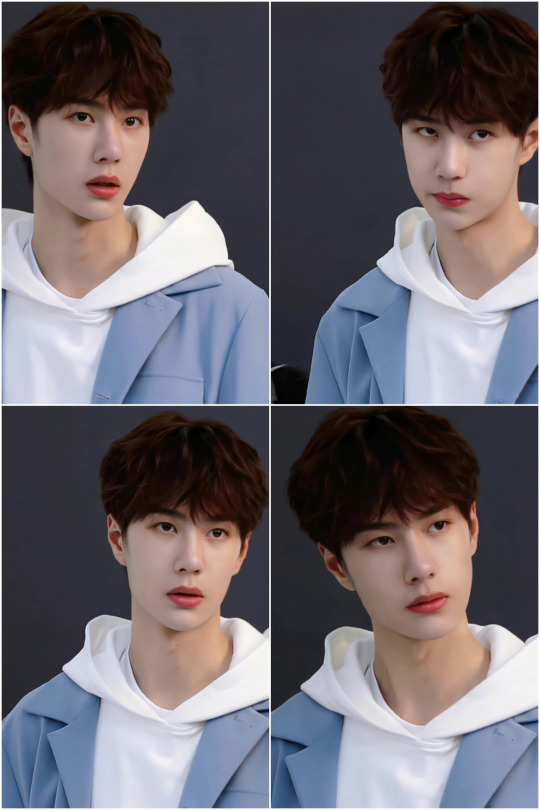


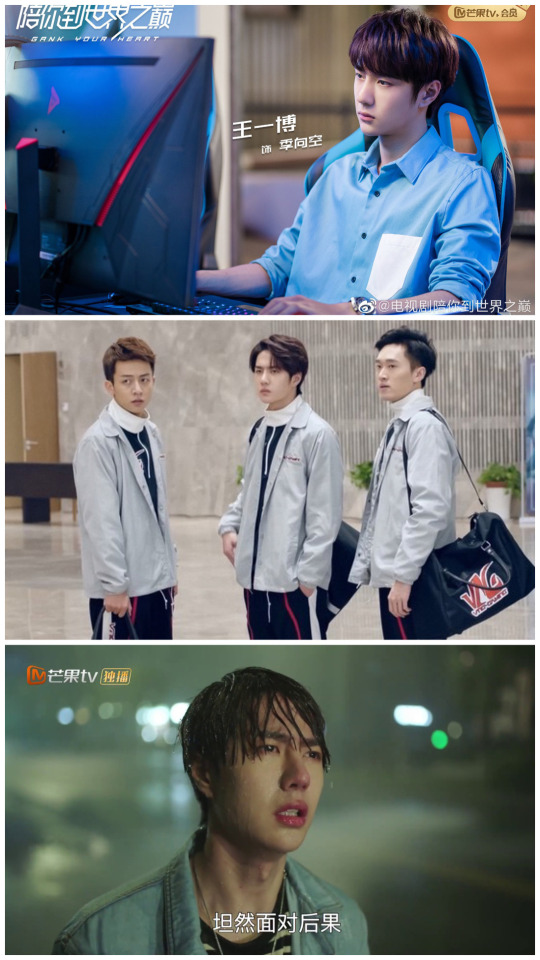
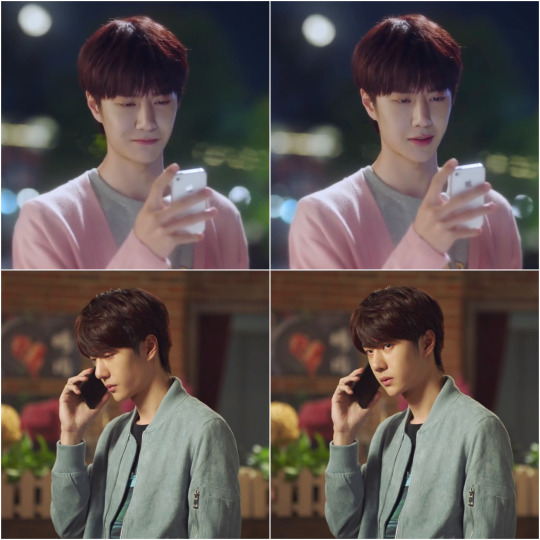


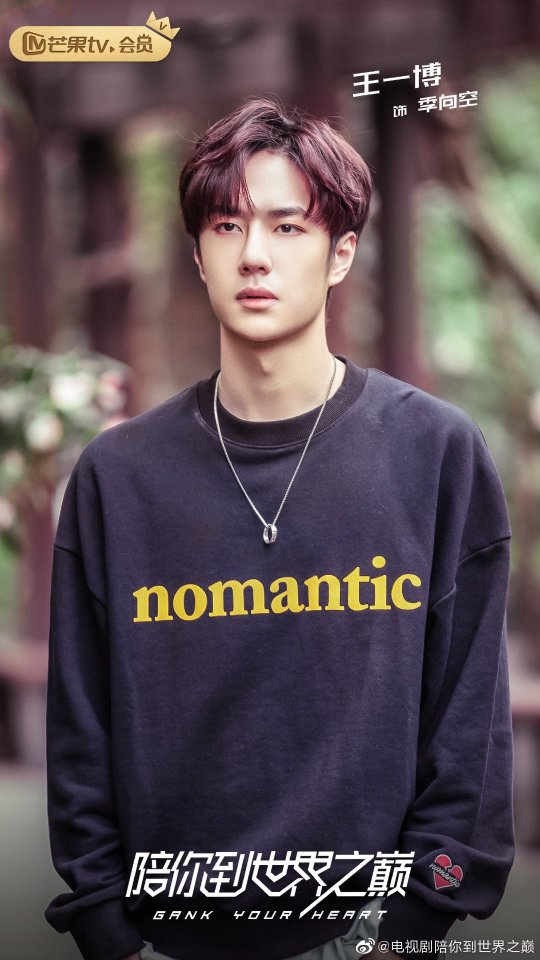

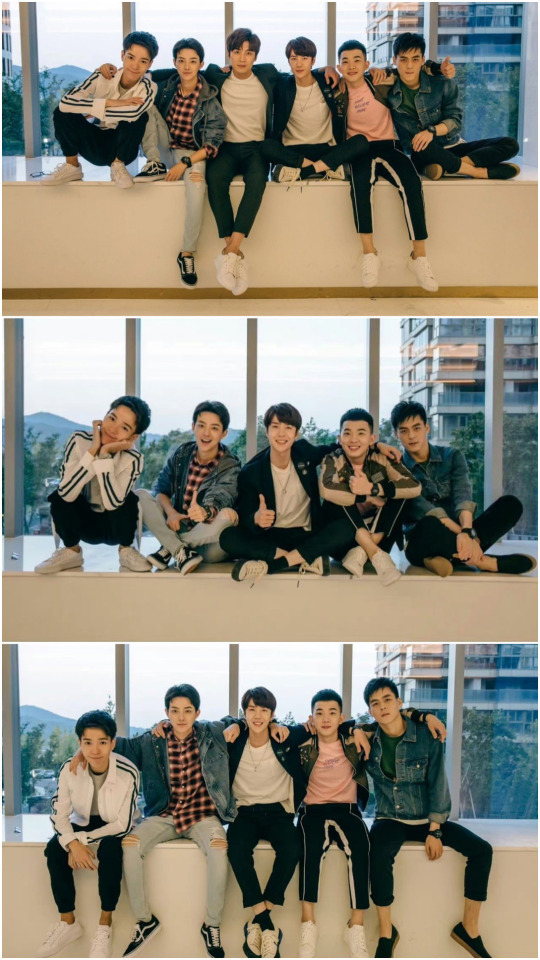
And a little treat: WYB dancing on set with the cast —
youtube
#Wang YiBo#ji xiang kong#gank your heart#So I adore WYB with my whole heart and JXK is kind of an ass in the beginning#Which I love because it gives us a nice character arc#In fact all of the characters get a character arc which is delightful#And I really liked Wang Zixuan as Qiu Ying. And her bestie played by Rain Lu was hilarious. The storyline with QY’s stepmom killed me#And Pei Xi is head over heels for JXK#but JXK just happens to wear Gu Fang’s RING on a chain for the ENTIRE SHOW#Not Wang YiBo just consistently choosing characters that somehow happen to be a little queer#there's some next level bullying and sabotage that happens in this show and I had to ask my bestie more than once if everything would be ok#Ji Xiang Kong isn’t deranged like Zhai ZhiWei but he is definitely as handsome#I love how driven the mains are. There’s also some interesting commentary on the price of fame and being an idol. Very meta#WYB pours himself into this role the way he does with everything and he’s just so fun to watch#i love him your honor#Youtube
18 notes
·
View notes
Text

"Miss Nakamura's friends are quite an...eclectic bunch."
#( open. )#the knight ( dash commentary. )#the knight ( verse two. )#guess what?? myungdae's muse is coming back with a vengence :)#well sorta! it's just a silly little dash commentary/thought i've had#since suki ( my aa oc ) is charismatic and doesn't realize it#and accidentally ends up befriend some...very powerful or unusual ppl#and i love that for her#patrick her acquiantance is....mildly amused if not a little worried#considering that he knows a lot of the ppl she does and he...doesn't quite like them as much FJSKLDJFSLK#also i have like?? a meta i wanna post that involve both patrick AND suki bc there's just??#a lot i've been thinking about them both and how it parallels one another#anyways. i have a few hours on here to write b4 i gotta head out#don't mind me using his 2d fc for this too :'D
3 notes
·
View notes
Text
i have a headache and can NOT think clearly enough to really gather my thoughts but as much as i really did like atsv there were just. things about it that didnt work for me. and like mostly i was not big on how they did the “canon events” stuff like im not AGAINST it just at points felt like sort of redoing the moment in itsv where after aaron dies the other spiderpeople are able to comfort and relate to miles because they’ve been through similar things and this is like... that but in a technical lore way and not hitting the same emotional beat?? like obvioulsy they’re taking it somewhere different and its about like defying the story that’s laid out for you and i LIKE that but. idk. and im like yeah obviously theres stuff thats part of the spiderman origin story we KNOW this we did it already in the last movie and it was a great scene. and also like theres no way everything they referenced is 100% true for every version of spiderman, even every single one that cameos in the movie?? idk. it just Frustrated me in a way that i truly cannot put my finger on
#anyway did my Actual Getting My Thoughts Sorted in the tags. so they got long.#atsv spoilers#im on my period and my head hurty and i feel like im thinking through a fog so. thats part of the problem#also im just like yeah man fixed events in the time stream or whatever its a very standard thing#idkkkk i literally feel like im close to a thought that i cant piece together#something something what makes spider people So Special that THEY have fixed destinies that others dont idkidk#was that what the web thing was?? being a spiderperson doesnt have to do with the multiverse tho like. idk if this makes sense#i promise im not being cinemasins about the lore here#its just like. i wanna figure out what it was that didnt work for me so i gotta talk it all out#and like i realize its meta commentary on comics and retellings and stuff too and. idk#something about 'its a fixed moment in a spider persons life that a police captain has to die while saving a child' feels kind of Dumb#to watch as like a Serious Moment?? idk#like obviously its TRUE to some extent bc. they are all retellings of the same story and thats the POINT#and i get that.#but also youre CREATING some of these stories for the movie#like idk a TON about hobie in the comics altho i'd like to read more im just kind of vaguely familiar#but what i can gather he has NO cop related backstory so like. now theyve given him one :|#and i dont love that!#and its like. yeah they want something that can connect to miles' dad. and hes a cop and this is something that is. Generally Speaking.#a connection in many spiderman retellings. but. again and i dont know this for a fact#does that happen in the comics to any spiderman other than different versions of peter parker?#like saying its a Key Thing when its. largely invented for the movie. maybe?#i like the storyline for miles and im like i wish it had been arrived at in some slightly different way? idk#had a great conversation about it w my brother in the car after the movie bc we both were kind of like 'oh' abt the whole movie#like it was GREAT but had been hyped up SO much and we were like. well this doesn't surpass or elevate the first#he thought miles' parents writing didnt feel consistent w the first which. i should do a rewatch of itsv tbh#and was commenting on how much gwen sucked and fucked miles over and im like yeah man i loved that#dont be cinemasins and say its a plothole bc she made bad choices#shes a scared teenager who bought into miguel's scheme and is making decisions a scared teenager would#we both agreed the soundtrack does NOT compare to itsv
4 notes
·
View notes
Text


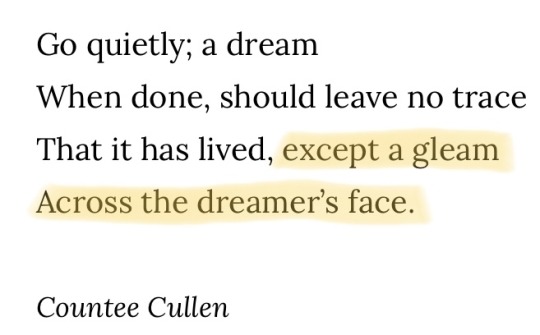


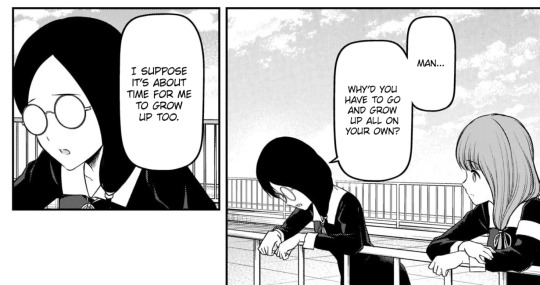

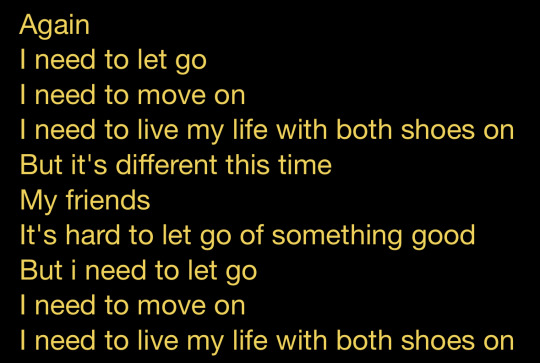
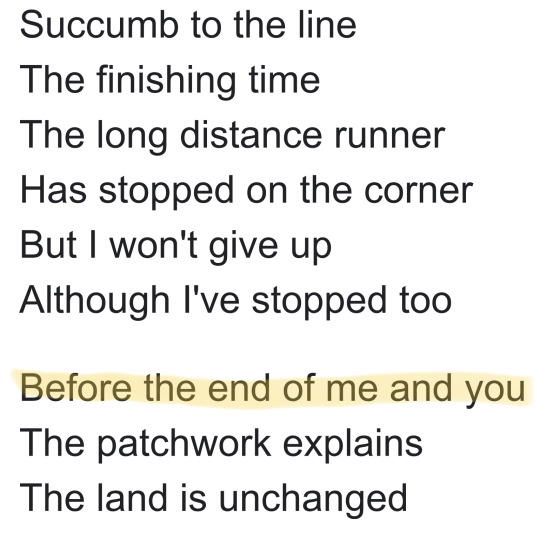

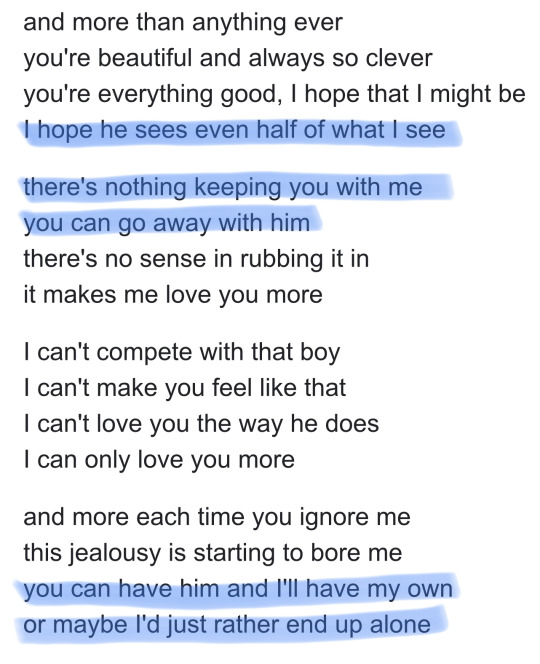
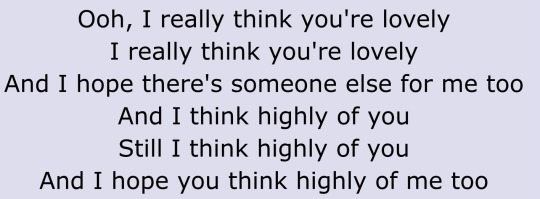
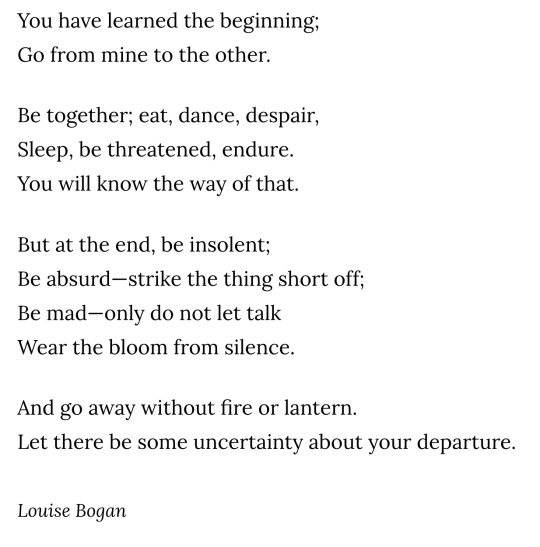
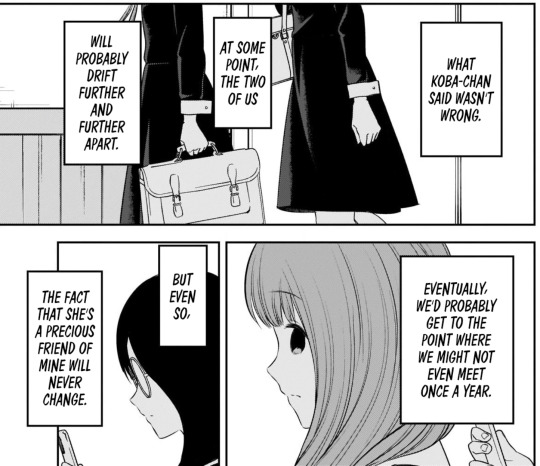
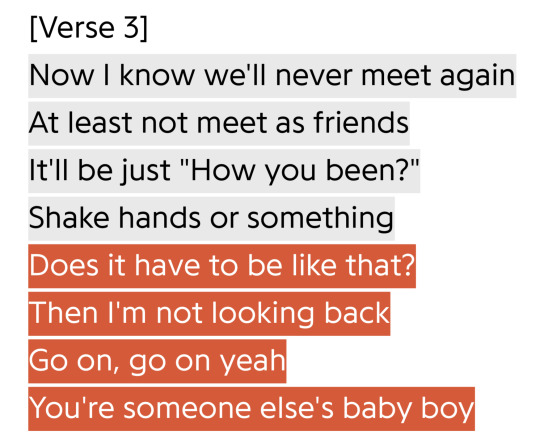


Having to Give Up Someone to Another Person
Countee Cullen, If You Should Go // Crane Wives, "Never Love an Anchor" // Louise Bogan, Words for Departure // Basement Tuesdays, "Jeffrey (Over You)" // Broadcast, "Tears in the Typing Pool" // The Softies, "Love You More" // Hot Freaks, "Lovely" & "Baby Boy" // AE Housman, Because I Liked You // Louise Bogan, Leave-Taking
#web weave#web weaving#compilations#iino & osaragi#iino x osaragi#kaguya sama manga#kaguya sama spoilers#kaguya sama wa kokurasetai#kaguya sama love is war#kaguya sama wants to be confessed to#once more im hiding my thoughts in the tags like a coward lol#there's a meta commentary angle w the original story but i think this pairing could say something abt the genre and idea of romance too#the 'prettier story' line gets two layers if one: osaragi is influenced by her upbringing and in-universe media to find iinogami 'prettier'#and two: she stops progressing her own story for the sake of another on the meta level too#hopefully communication w Iino lets Osaragi grow past some preconceptions and reveals a story that's not always pretty#but is hers no matter what and depends on noone else's but hers#but that's so beyond my scope i have to leave it up to a more galaxybrain writer than me#that's why i make webweaves with these poems lol they say it better than i could and i add it to the collage#they dont even have to be old and dead eg i feel like the softies ripped my idea for what happened straight out of my head#also 'that you may blind me no more' at the end is such a good coincidence w Osaragi's glasses
17 notes
·
View notes
Text
my favourite thing about the polyamorous community is their continuous dedication to finding the og flag so ugly that they come up with alternate designs, and all of them managing to be just as bad, if not worse than the original
#like don’t get me wrong I think it’s genuinely great#like I’m so so happy that polyam people care about our community and our attractions to the point of making their own flags with meaning#and I’m sure there’s some kind of meta commentary about how the nature of polyamory is tied to an abundance of love so it makes sense -#- to feel like it’s can’t be represented/contained by one single flag#but still#the og flag isn’t even *that* bad y’all are just mean#original content? on my blog? it’s more likely than you think#elijah’s being queer again#polyam#is this flag discourse? idk#probably
3 notes
·
View notes
Text
INEFFABLE META MASTERPOST
Because I'm slowly losing count and need to organize. So, here's all my self-written metas or ones that I reblogged with my own added theories and commentary! In rainbow colours, naturally.
1 – Aziraphale, I love you. But you lied. And here's why.
My most lengthy and proudest meta about the Final Fifteen and why I think Aziraphale lied on purpose. (Also: The absolute darling @esthermitchell-author bravely fought their way through it and wrote up some more interesting points and different takes on what I came up with. If you want to go down a S2 rabbit hole with us, go read it here.)
2 – Why Aziraphale is an unreliable narrator (links below)
A three-part meta in which I try to analyse and explain that all of the minisodes in Season 2 are not objective narrations but actually Aziraphale's memories.
Part 1: The Story of Job
Part 2: The Story of wee Morag
Part 3: The Story of the Magic Show in 1941
3 – The Jane Austen Ball and why it was never about Nina and Maggie
A meta in which I go into unnecessarily great detail about how the Whickber Street Meeting Cotillion Ball was meant to be Aziraphale's confession to Crowley.
4 – Crowley & Aziraphale were never free (reblog)
A reblog of @baggvinshield's post in which I explain why miscommunication is the single biggest ineffable enemy in Season 2.
5 – In Defense of Aziraphale (double reblog)
A double try at explaining why I think Aziraphale's POV in the Final Fifteen is just as horrible as Crowley's and why I don't think him "choosing" to go back to Heaven was the only point of his character journey.
6 – The Art of Miscommunication: Ineffable Edition
A meta in which i once again explain why miscommunication is the single biggest ineffable enemy in Season 2.
7– Season 2 Bookshop Shot Meta
A meta where I briefly loose my mind because of a single bookshop frame in Season 2.
8 – What if it wasn't Aziraphale and Crowley who performed the 25 Lazarii miracle?
A mini-meta in which I propose the theory that Jimbriel helped with the miracle to hide himself away from Heaven & Hell.
9 – Things in Good Omens Season 2 I still find weird (reblog)
A reblog of @ok-sims and many other great OPs' thoughts on the weird loose strings in Season 2 and what unanswered questions I still have myself.
10 – The Deleted Bookshop Scene (reblog)
A reblog of @skirtdyke's video and @i-only-ever-asked-questions' smart thoughts on it, with my own overly-excited 'what that could have meant for the "It's too late" line'-theroy.
11 – The Bentley Handle Easter Egg
A meta I can proudly say has been liked by none other than Mr. Neil Gaiman himself about Crowley's Bentley handle that might have existed before the Bentley ever did.
12 – The F*cking Eccles Cakes
A meta where I briefly loose my mind because of a pastry. (Addendum: People said very smart things in the comments of the post!)
14 – Re: "You go too fast for me, Crowley"
A meta in which I make myself sad by connecting that infamous line to Aziraphale assuming Crowley wanted the Holy Water as a suicide pill.
13 – Trauma-Dumping on your plants: The Anthony J. Crowley Chronicles
A meta on why Crowley treats his plants the way that he does.
14 – Demonic Mental Health Awareness Post
In which I talk about why I want to get Crowley a therapy voucher.
15 – The Curious Incident of The Flaming Sword in Good Omens
A meta on why the Flaming Sword has no deeper meaning. Or does it? (Updated: here's a reblog from @queerfables who did a wonderfully exellent job at calmly explaining all the swordy questions I was yelling about! Consider this meta solved.)
16 – Ceci n'est pas une plume
A meta in which I'm a bit of a nerd for language and also explain why learning French and magic the human way says so much about Aziraphale as a character.
17 – The meaning of "I forgive you"
A meta in which I explain what both "I forgive you"s mean and why Aziraphale will always fight for what is right until he wins. Also, the lovely @sharksbeerr translated it to Chinese on Weibo!
18 – Memory, or the lack thereof, in Season 2
A little reblog on how memory is a big and unresolved, leaky-bucket theme in Season 2.
Addendum:
The one non-spoiler-y ask I could come up with about S2 that was actually answered by Neil, yay!
Also, this wholesome little post I added to that Mr. Gaiman also reblogged. :‘)
*** This is a work in progress and will get updated every time I post a new meta! ***
#good omens#good omens season 2#crowley#aziraphale#ineffable husbands#gos2#go2#good omens 2#good omens meta#good omens s2#my own meta#good omens season 1#meta masterpost#ineffable-suffering
508 notes
·
View notes
Text
Benrey's dialogue for his entire boss fight is so contradictory and honestly doesn't add up at all, which has lead to a lot of really good discussion about what his true motives are, how much are his own and how much is the game's, and how much autonomy he actually has. You go from comments like "I can't wait for you guys to see hell!" and "OHOHOHO I'm gonna getcha!" to "no don't shoot me if you shoot me I have to shoot back" and "you forced me to be baaad, so i'm gonna be baaad, friend."
Scorpy did say in the cast commentary that, earlier in the episode when Benrey randomly yells "I'M GONNA FUCKING KILL YOU!" that was him remembering that he's supposed to be the bad guy, so there's the meta on what's probably actually going on here, but it does offer some valuable insight into how Benrey thinks about everything and how he's interpreting it.
You might see him as just a dick, or a villain, or you might see him as manipulated by the game or Gordon in some way, shape, or form, or some secret third thing, and literally any of them could potentially be canon because of the improv nature of the series and I love it so fucking much.
basically tl;dr "you forced me to be baaad, so i'm gonna be baaad, friend" is one of the best lines of dialogue in the whole series and not even because of how funny it is. It's just GENUINELY such a good line.
152 notes
·
View notes
Text
Neil Gaiman's CHIVALRY: From Illuminated Manuscripts to Comics
One of the many reasons I wanted to adapt Neil Gaiman's Chivalry into graphic novel form was to create a comic as a bridge and commentary re: comics and illuminated manuscripts.
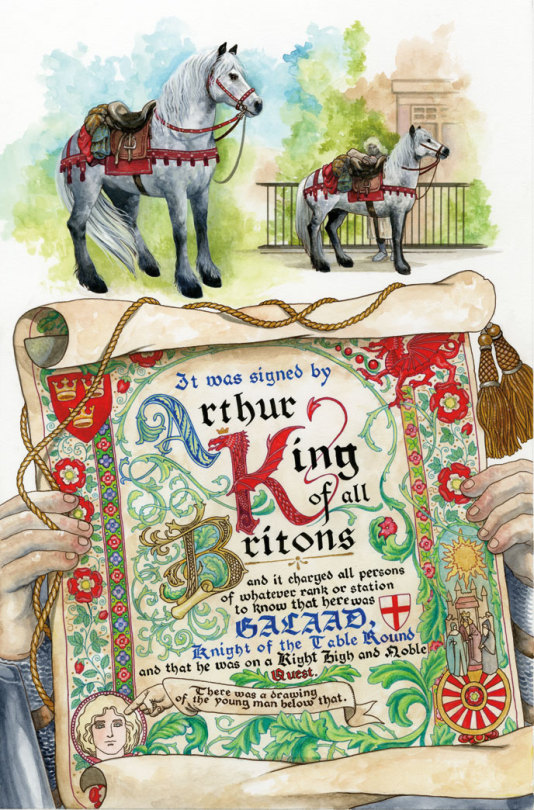
We're often told that the first comic book was Action Comics #1 featuring Superman, a collection of Superman comic strips that morphed into comic books as an art form.
Sequential art predates Action Comics #1.
Action Comics popularized sequential art book storytelling that had already appeared in other forms in fits and starts throughout history. Comic books didn't take off as a popular medium for several reasons, not least of which was the necessary printing process hadn't been invented yet and it's hard to popularize - and commercialize - something most people can never see.
You find sequential art in cave paintings and in Egyptian hieroglyphics. I've read that comics (manga) were invented by the Japanese in 12th century scrolls.
And sequential art appears over and over again in Western art going back well over 1000 years, and in book form at least 1100 years ago.
The most obvious example of early sequential art in Western art - as a complete narrative in sequence - is the Bayeux Tapestry.
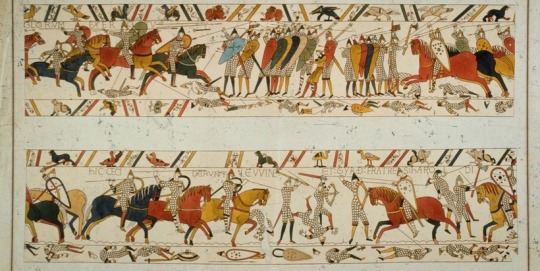
At 230 feet long, this embroidered length of cloth was likely commissioned around the year 1070 by Bishop Odo, brother of William the Conqueror. It depicts the Battle of Hastings in 1066 and the invasion of England by the Normans. (The tapestry was made in England, not in France, but it is called the Bayeux tapestry because that's where it is now.)
Imagine what a task it was to embroider this thing. Whew. And you thought it was hard learning Photoshop.
This work of art is important in the history of sequential narrative, but the Norman invasion is also important to the legend of King Arthur - and another important English legend - for reasons we'll get into later.
It's complicated.
All this is why you see this art in the background of this page of Chivalry.
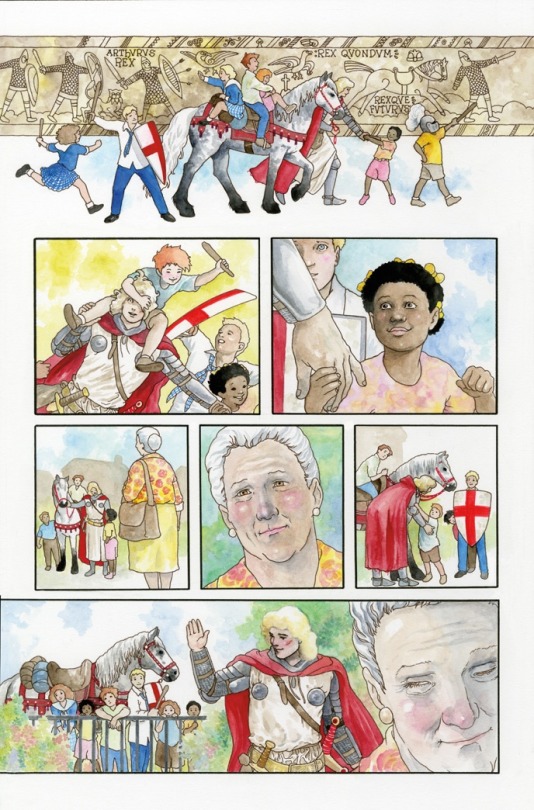
Using the Romanesque art style of the tapestry in panel 1, I've added the Latin phrase "Rex Quondom, Rexque Futurus" - "The Once and Future King", the final words of Sir Thomas Malory's Le Morte d'Arthur as inscribed on King Arthur's tomb, and the title of T.H. White's famous Arthurian novel. (EDIT) and it has been kindly pointed out to me that QUONDOM should be QUONDAM, which is hilarious and annoying and this is how history gets rewritten by accident.
My original intention was to draw this Bayeux Tapestry scene out and juxtapose it with shots of Galaad interacting with the children, but the two page sequence I imagined didn't really work as well in reality as it did in my head.
Foremost among my concerns was that the tapestry reference might be too obscure for most readers. I wanted to weave the visual meta-text of Chivalry into the story (For further reading on this project and my use of visual meta-text, symbolism, and history in Neil Gaiman's Chivalry, go HERE. And HERE. And HERE. And Yet again HERE.) in such a way as it would enhance the experience for people who "got" the visual meaning, while not dragging things down for people who didn't. So I cut this scene down to one panel.
The tapestry is a complete, long form comic strip created over 1100 years before some people claim comics were invented. So, I loved being able to reference it here.
But even more interesting to me are the sequential art sequences that appear in illuminated manuscripts - comics in book form.
I once got into a rather vicious argument with an academic who insisted illuminated manuscripts were comics. I said no. She said yes. Then she insulted the lowly comic artist and blocked me on Facebook.
Whatever.
My point was not that you can't find sequential art in illuminated manuscripts. My point is that an illustrated book isn't de facto a comic. Most illuminated manuscripts are illustrated books. Some illuminated manuscripts contain sequential art.
Just because opera is music, that doesn't mean all music is opera.
Just because comics books are books that doesn't mean all books are comic books.
And just because some illuminated manuscripts contain sequential art, that doesn't mean all illuminated manuscripts are sequential art.
But one is.
Let me show you it.
One of the earliest examples of an illuminated manuscript with comic art is The Bible d'Etienne Harding which you can see in this really bad jpg here, sorry, best I could find.
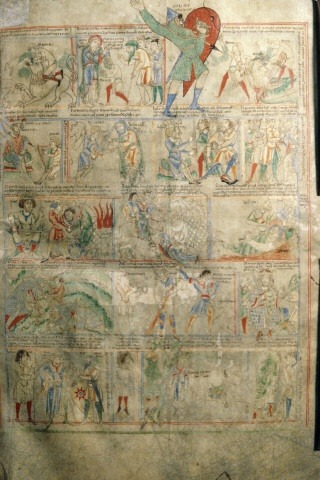
Created around the year 1109, property of a French Cistercian monk, it combines sequences like this with pages of text and illustration.
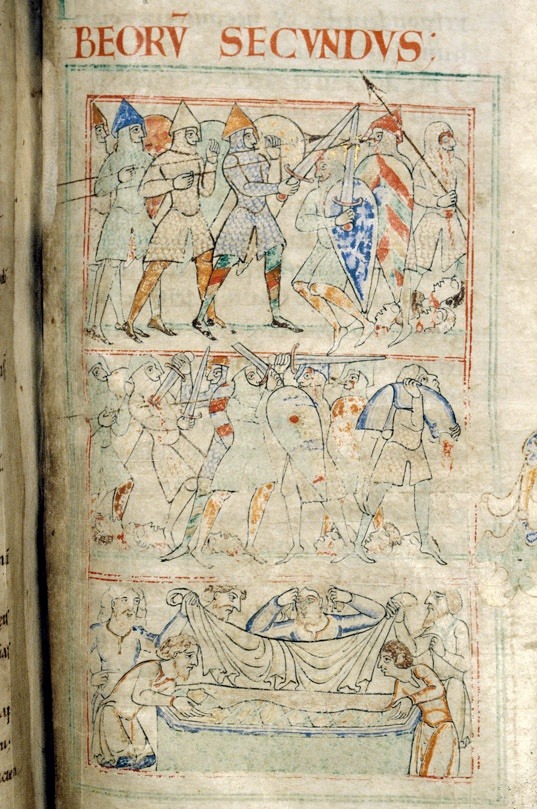
Not a comic book IMHO, but an illuminated manuscript with sequences of text, illustration and sequential narrative.
It's no more a "comic book" than a newspaper is for having text, illustration, and comic strips in it.
IMHO, academic lady.
And here's a look at the Old English Hexateuch (hexateuch refers to the first 6 books of the Bible) which I think is far more visually complex and interesting work, and comes much closer to the illuminated manuscript as comic, but still intersperses large sequences of text and illustration with sequential storytelling sequences. So I don't consider it a comic, but a book with sequential work in it.

Now this work below is a different matter. This is from the Holkham Bible Picture Book, circa about 1330.
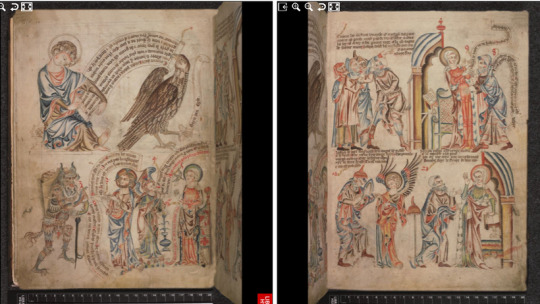
This thing is genius. It measures a little larger than a modern comic, around 8"x11", and almost every page of it is like this spread here. 231 pages of beautifully rendered art, with repeated use of banderoles - "speech scrolls" (basically word balloons) - and captions, and (mostly) real sequential art. I've never seen anything else that comes even close to it, and by all accounts, neither has anyone else.
It may not be a modern comic book - but it's a comic book as far as I can tell. I don't think there's any other illuminated manuscript that is as complete, sophisticated, and innovative a sequential storytelling work.
If this were printed and seen by more people, the comic book medium would have taken off centuries earlier, IMHO. But it wasn't. It was tucked away in a monastery somewhere and few people ever saw it. It ended up being forgotten for centuries until it popped up again around 1816 when a banker sold it to an avid book collector, Thomas Coke, Earl of Leicester, who inherited Holkham Hall and its library and set about restoring and expanding it.
The banker wrote, “a very curious MS. just brought here from the Continent. . . which I think one of the greatest curiosities I ever saw”.
Sequential art got invented over and over and over by one artist after another until one day centuries later, some teenaged boys found their newspaper strips gathered together in a cheap format, and suddenly comic books were popular and like new.
And then a lot of people who didn't seem to realize that books had had pictures in them for centuries got all up in arms about the harms of books with pictures in them.
I think it's funny that it is called the Holkham Bible Picture Book. There really was no "comic" art language when this work was created or when academics began to catalogue this sort of thing. Will they change the name now?
Who can say.
Anyway, another Holkham Bible Picture Book reference for you.
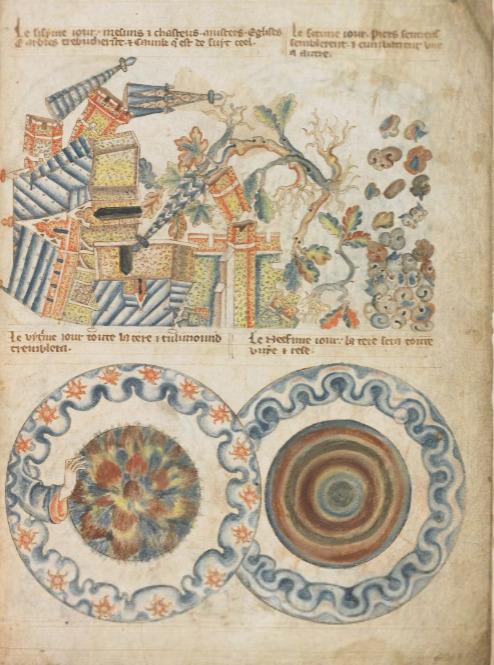
Look familiar?
I referenced it in this scene in Chivalry.
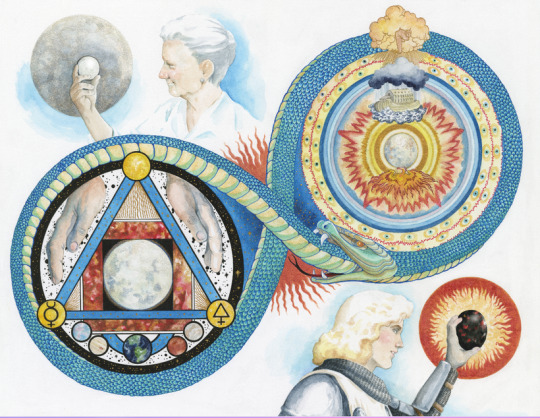
One of the fun things about the Holkham is that it opens with a discussion between a friar who has commissioned the work and the artist. The friar admonishes the artist to do a good job on the project because it will be shown to important people. And the artist responds, "Indeed, I certainly will and, if God lets me live, never will you see another such book."
He wasn't kidding.
You can see the entire manuscript HERE.
Sponsored by my Patreon. Thank you.
#chivalry#neilgaiman#neil gaiman#darkhorsecomics#dark horse comics#illuminated manuscript#medieval art#medieval manuscripts#watercolor#watercolor art#king arthur#arthuriana#arthurian legend#sir galahad
2K notes
·
View notes
Text
TBOSAS Meta
This started as a couple-paragraphs-long Everlark & Coryo x Lucy Gray rant. It turned into an essay on the politics of systemic oppression and how we illustrate it in fiction, with The Hunger Games and Ballad as case studies. Regardless, I hope others enjoy, lol. This is where my brain lives, now, as I expect it will the rest of 2023. Cheers!
***
It’s been interesting, the last few days, some of the discourse that’s popped up around TBOSAS. FASCINATING political discussions, as I’ve come to expect for a Suzanne Collins release. (#1 in my heart.)
Personally, I always separate books vs. movie canon with her franchise. With the OG Hunger Games, sometimes I felt the films were better—like she got another pass at it and REALLY took advantage, and utilized the hell out of taking it out of Katniss’s first-person POV to develop other characters and the world (still without detracting from her narrative)—while for some details, I preferred the books.
With TBOSAS, though, the book and movie feel almost entirely different to me.
There are MANY shared elements, of course, and I feel either version gels quite nicely with the OG franchise. It’s not even that there’s that many continuity differences—some things cut or altered for time, sure, but the bones of the plot are the same. Both illustrate astute political commentary, Coriolanus’s descent into madness, Tigris’s shift in position on him (foreshadowing her full turn by Mockingjay), and Lucy Gray’s role in his life in both his initial downfall and his defeat by Katniss. The actors and creative team all did BEAUTIFUL work bringing it to life, and I honestly love both versions.
But fans who mainly like the book may be frustrated by the sympathy Coryo garners in the film.
Normally, I’d say this is because the book reveals more internal monologue—and it does. But honestly, one of the things I was most impressed by in this film was how legible the actors’ internal monologues were. It was clear, the amount of work they all did to that end. So I don’t know that it is just more. I think it’s also different.
Book Coriolanus devolves much earlier and more obviously. He starts from the same pressed circumstances and has moments of goodness, but he becomes the villain we know him eventually to be pretty damn fast.
Film-Coriolanus has a much slower descent. Ironic, honestly, given the film has far less time than the book does.
I think as a result of this, I’ve seen discourse comparing beats in his relationship with Lucy Gray to Katniss and Peeta. For example, that beautifully shot/choreographed/performed scene in TBOSAS with him and Lucy Gray on either side of the fence after the bombings that night, where they almost kiss and he asks her, “Is this real? If I’m going to risk everything?” being compared to Peeta’s long game of “real or not real” throughout Mockingjay. Everlark folks (rightfully) pointing out that for Peeta, the refrain is about shared trauma, especially between him and Katniss, and both of them grounding their relationship in mutual trust—while asserting that for Coryo, the same refrain comes from a place of selfishness.
I get where this opinion comes from: President Snow is probably one of the most violent, sadistic, genocidal dictators in modern popular fiction. His relationship with Lucy Gray started as transactional—even more acutely in the book. Nearly everything Book-Coryo does is for his or his family’s personal gain.
But to me, half the beauty and tragedy of the film is this delicious possibility—the hope—they showed us.
THG has always had a strong anti-war philosophy in general, with through-line commentary on showmanship, propaganda, surveillance and performance: The recurrent themes of cameras always bring on them, the arenas and entirety of Panem being a stage/game—and how those things impact authentic human relationships. Everlark hit for so many because of the ways authenticity bloomed out of that hellish, contrived pit. Coriolanus and Lucy Gray’s relationship started out similarly contrived: Thrown together by the politics of the Academy, the uprising, the districts, the Capitol and the Games—helping one another survive. Largely unlike Katniss and Peeta, they both played the game intentionally, to varying degrees. (Personality wise, these four really have almost nothing in common, lol.) Lucy Gray is a good person, both in the end and from her start (unlike the terrorist Coriolanus becomes). But she is a performer. He’s right about that.
So honestly, I don’t see much purpose in reading Peeta’s question as valid while Coryo’s wasn’t. I think that judgment is colored by dramatic irony—us knowing who they each become. But in theatre, we talk about living honestly in imagined circumstances. It’s used in a lot of acting techniques, but particularly for people playing villains. To stay grounded in the truth of it, you have to believe honestly in the imagined moment, not the gestalt; Leslie Odom Jr. was a great Aaron Burr because every performance, he believed in the whole journey, from hope to ruin. Tom Blythe was a great Coryo because he invested in the earnest reality of Snow as a young man, not the devil we know he becomes. And at that point in the story, at the cages that night with Lucy Gray, Coriolanus was honestly grounded in similar struggles as our OG heroes: Trying to provide for and protect his starving family. His family (and the Capitol at large) reeks of privilege, and his prejudices were obviously flawed. But in his developing love for her, he was steeped in starvation, the same political forces as lashed all citizens of Panem, and was clawing his way from beneath just as much Capitol propaganda as people from the Districts—perhaps even more so, given his Grandma’am and how his father died. Because of their given circumstances, politics bled into everything—but eventually, so did feeling, and they had several moments of genuine bonding, trust and connection which the actors invested in beyond their political need for each other. There’s a constant push and pull: Holding hands at the zoo for the cameras was political; her reaching for his hand in the arena visit was less so. The first “Stop treating me like I’ve already lost” in front of everyone was wit-soaked survival, while “Please don’t let me die in that arena tomorrow,” near-whispered and with hands held between them where the camera would struggle to see, bled into real vulnerability. Saving him from the other tributes in the cage-ride to the zoo was about survival; risking her life to go back for him when the arena was bombed was at least a mix. Her motivations for singing in her interview are complex—perhaps guilt that a “rebel” attack nearly killed Coriolanus, his advice she’d get the most money that way—but I feel strongly that a non-zero amount of her was motivated by wanting to demonstrate that she trusts him, which for her is even higher-prized than love. And I also feel that, after the hospital and her “final performance”—leading up to their near-kiss at the zoo—Coriolanus scoped out the arena (and ultimately took all those risks to help her cheat the Games) both because he wanted the Plinth prize, in theory, and because he increasingly desperately wanted her to live.
The waters between them were thoroughly, legitimately muddied—which I believe was intentional, that constant tension between authenticity and politics. And as much as he was falling for her, Coriolanus saw that Lucy Gray was just as clever and good at crowd-work as he was—maybe better.
So to circle all the way back to this Everlark comparison: Given the absurdly multilayered situation, is it really that selfish or unreasonable he would check in with her during that moment through the fence? That this child—wrapped in oppressive patriarchy, violence, starvation and propaganda—would ask for reassurance before he was willing to be vulnerable, or to potentially risk his family’s lives?
Some artists are hesitant to engage with the humanity of “villains,” their origins, because they feel humanizing them excuses them. In real life, I get this: Second chances aren’t always the answer, and people need to be held accountable. But isn’t it more powerful storytelling to demonstrate the corrosive nature of all systems of oppression in our fiction, to show how they can corrupt even those who try, than to condemn people before they’ve even had a chance? Isn’t the beauty of Lucy Gray’s whole thing that everyone starts out good, and it’s our job to choose to stay on the right side of that line?
And when President Coriolanus Snow finally chokes on his last rose, wouldn’t it be a more satisfying victory if we imagined him as a real-feeling person—full owner of sixty years of horrifying choices—rather than a cartoonishly evil cardboard cutout?
Book-Coryo has a more obviously manipulative/evil streak, much earlier on. To make it plain: He’s an ass, and his “love” for her reads more like obsession. But my favorite aspect of the film (and I feel one of the most compelling) was how it illustrated that these systems of oppression can make tragedies of almost anyone: All but those at the very, very top. Suzanne’s anti-capitalist politicking—how classism turns everyone below the 1% against each other, where the “upper middle class” (doctors/lawyers/actors) is vilified to the poor as a red herring while a handful of robber-baron CEOs amass almost all wealth on the planet—strikes again. She, Francis Lawrence, the film’s creative team and these actors came together to put tragically human faces on that struggle—how hard it is to stay a good person amidst intense, violent, systemic oppression.
But none of that sings quite as true if you go into it having decided that Coriolanus was evil in his bones. The stakes are so much higher, richer, otherwise. If his love—for Tigris, for his family, for Sejanus, and yes, for Lucy Gray—was, or became, authentic.
It’s not a descent into madness if he’s already mad. Or, as he put it in the original Hunger Games film: “Hope. It is the only thing stronger than fear.”
#the hunger games meta#thg meta#thg series#tbosas meta#meta#tbosas#the ballad of songbirds and snakes#ballad of songbirds and snakes#Everlark#suzanne collins#Coriolanus snow#President snow#tigris snow#lucy gray baird#coriolanus x lucy gray#Lucy gray x Coriolanus#sejanus plinth#theatre#directing#film#francis lawrence#tom blythe#josh andres rivera#rachel zegler#leslie odom jr#aaron burr#Hamilton#hamilton musical#acting#acting school
301 notes
·
View notes
Text
this post has me thinking about steve and eddie falling in love with each other through writing fanfic in the 80s
because in the eighties before you could publish stuff online, you had communities that would send each other hand written fic, right?
steve and eddie both end up writing fic for spock/kirk
steve gets into it because he and claudia watch star trek together and they've been watching it for years when she shows him some cute fluffy fic a friend of hers wrote and he finds that he really likes it. maybe he starts off not knowing that he likes guys, but through fic he realizes that hey, he's kind of felt things about guys before that's similar to the stuff he's reading
and he gets enmeshed in this somewhat local community of fic writers and they all mail each other fic and give each other feedback and write on post it notes how much they loved reading it before passing it along to the next person
and steve has a particular writer that he's absolutely enamored with
the way they write, the tales they weave, it's all so good. they're funny and some of the spicy stuff they write is good and he's always so excited whenever he opens a letter and it's their fic. and he thinks he's like falling for some housewife from Indianapolis and he's a little embarrassed about it because they only sign their name as EM so he has no idea who it is. (he's also embarrassed because some of the spicy stuff claudia writes is also good, but he tries not to think about how his friend's mom knows so much nsfw stuff about what two guys can get up to)
but anyway, he keeps writing long detailed commentary about EM's fics and sending it along to the next person meanwhile when Eddie gets his fics back, he's like lovestruck at steve's comments on his fics because he really gets it - really gets what eddie was going for. he understands the yearning eddie's trying to capture and he offers little meta-analyses about eddie's fics and some of the episodes and eddie is also like damn i'm really falling for someone's wife, aren't i?
anyway steve doesn't write his own fic yet because he doesn't have the confidence in his writing ability but EM encourages him so he eventually does write fic and EM ends up being his biggest cheerleader and offers him help in areas where he thinks he struggles so they start mailing stuff back and forth to each other before it goes out to the larger group
and they start sharing stuff about their real lives and they both come to realize that the person they're talking to isn't a woman and isn't married like most of the women in the community are
and then they're collaborating on fics together and writing some of the best stuff eddie's ever written and he's falling in love and steve is too
maybe they eventually share their identities over letters, and maybe there's a meetup one day and their eyes lock as soon as they see each other and steve is nervous. he's nervous because he's kind of idolized EM for so long and he doesn't want to say the wrong thing. because writing him has been easy, he has time to think about what he wants to say and how he wants to say it. but talking in person is much more on the spot thinking which he's never been good at
but he meets him and eddie seems just as nervous, not nearly as eloquent with his words in person as he is in the fanfiction steve's been reading for close to a year now. but steve thinks he's charming and he's just as enamored in person as he was over the letters they've been sending each other.
on the ride home, claudia is chattering away about how nice everyone is and how nervous she was to meet them, but they're all so sweet in person. and steve is half-listening, clutching the slip of paper eddie gave him with his number on it
#steddie#steve harrington x eddie munson#steddie ficlet#stranger things#st ficlet#janai.doc#i have a thing for them falling in love before they ever meet#i think it's so sweet
528 notes
·
View notes
Text
I think it’s really funny how Danny is obviously a storyteller, but then his enjoyment of movies is basically forgotten about in his lore. It’s hard to tell if this is just a leftover nod to Scream, after-all “what’s your favourite scary movie?” is iconic—even if there’s absolutely zero evidence to support Danny using a similar method of phone-based psychological torture during his actual kills.
But his love for cinema must be intertwined with his usage of photography I would think. And this is what I think would be the most interesting aspect in his storytelling, personally. Initial photographs he takes while stalking are likely to be very basic, there’s some element of composition but it will be hampered by the fact you are dealing with unknowing subjects—it becomes a project of dealing in abstracts. Finding perfection in imperfection.
However, the final photo of his victim will be different. He has, in theory, enough time to stage a shot exactly how he wants it to be. He has the power to rewrite the story to his liking if he feels like something did not go the way he wanted it to by visual staging of the body and effects.
The Ghostface mori is a very quick event, but this to me is more an instance of game design over lore. He probably does take quick photos for certain kills, ones which may not be planned but are still meaningful—like the cop in Philly, or the entire situation of the trials in game… but I don’t think quick photos are the essence of his photography.
He’s too obsessive.
Bringing this back to movies, I think his photos borrow a lot from film language—there’s a lot of overlap here when it comes to staging shots which can be used, the main difference being film utilizes movement whereas photography is technically still-frame.
He probably loves a good Dutch angle, ya know? Horror staple.
Anyways, my end thought is that I think it’s really interesting to consider that Danny probably would not enjoy Scream—any of them. The meta commentary and satire would be lost on him, it would offend him.
#danny johnson#dbd ghostface#ghostface#dead by daylight#danny jed olsen johnson#dbd lore#dbd headcanons#shitpost
67 notes
·
View notes
Text
This antiblack campaign the fandom just tried to kick up again (to avoid talking about the real issue with Nalyra) reveals how powerless they're starting to truly feel now.
They don't have many users left to vilify so they're putting people on blocklists who are brand new (I was here 3 days lol) or not even really in the fandom. That looks goofy and desperate but then it keeps going.
DMing strangers to say "the truth" isn't about racism and "talk to me if you really want to know about anything." Everyone's reblogging those blocklist posts now and adding large commentary suddenly, when before they often fully sat it out. They're doing this in a group to look like they have larger numbers and are "revealing" there's a "big secret bullying problem"....except nobody believes them. Because there's plenty of accounts who are out here saying this shit straight to their faces and they pretend we all don't exist.
All of this group has to manufacture drama solely because they just don't want to talk about harmful shit they actually do.
Neil has to make an antiblack statement she made suddenly be about antisemitism towards her, Nalyra's antiblackness is "actually" fans upset about shipping and "what's REALLY coming" in S2, showmey0urfangs is always happy to show up with her dumb screencaps and villain monologue nobody asked for so she can make her everlasting outrage about popular black fics and "feminized" Louis sound deeper than it is, Virginia suddenly cries about IRL issues and wants to leave the fandom because she wants to distract from the Nalyra receipts, Keybearer accused another black fan of trolling people and getting accounts suspended on twitter in 2023 when a Marius fan eventually confessed to it and his eternal shame for that means now every black fan except him is a bully (despite nobody talking about this ever anymore except him), chicalepidopterare mocks a black fan for blocking her "because I thought we were supposed to talk about racism" and then poorly tries to frame any retaliation against her to look like bullying ("see, they're misogynistic, they're bullying my art, they're mean for disliking these ships!").
To quote Claudia here, "You must think me an idiot."
And the big cherry on top is also how none of these losers can stand to hear any mention of race....in the fandom of the show that nonstop talks about race. They're using very basic (and meant in a gentle, loving way) teasing of Jacob as proof that black fans are racist against Jacob too, black fans hate Jacob's white wife. People hate Lestat for being white too (what?). They can write crap meta all day about Lestat letting Louis "rape" him and only white victims (Lestat) being real victims to the evil black and brown "true" manipulators (Claudia, Louis, Armand) but gentle teasing from black fans about Jacob's haircut is the real racism. Okay lol. Care to tell us again why you think Delainey's Claudia looks "less innocent" now then? This 3D chess you think you're playing isn't playing how you think for anyone else.
I also notice that afaik there's not a single black American in this group. Idek if there's many Americans of any kind in the group. It's been a lot of shaming to black Americans specifically though, again from the show that's focused on black Americans....by people who aren't black Americans.
"There's people pretending to be black so it's okay to keep hating this whole group." It's not enough you already nonstop shit on black fans as it is, now you have to try to angle it as if none of this could be authentic in the first place. Vile behavior. For what? Tumblr isn't even a platform that pays you for whatever clout you have, so really what is the point here. In a small ass fandom on top of it. Some of you have pretty grown kids too, this is extra sad. It makes all the jumping through hoops to coddle Lestat's behavior make sense though, if you're the same kind of person yourself.
Anyway, maybe you don't actually know everything because race exists in the real world beyond how Anne Rice wrote about it in her useless books! You make books written by a racist white woman your whole personality and guess what your outlook on life is going to be.
It's been really pathetic to especially watch any fans of color move more to this extreme bullying side as time has gone on. It will never pay off to promote white fandom ideals. These accounts you're trying to cuddle up to aren't even that big. The fandom outside of the tags actually has much more popular posts, supporters, and fics...although that's also half of what this all is actually about, fic numbers. Again, these are grown adults obsessing over this. We could have a whole different fandom if this group didn't exist and keep wanting to gatekeep everything and be the only people who get praise about anything.
It's no surprise that people who worship Anne Rice have major ego problems themselves. It's been fucked up to deal with but the good thing now is that big egos have big collapses eventually and that's what we're starting to see happening now. People are sick of you and able to see through your basic ass manipulation techniques. People just want to have a fandom, they're not here to worship fans who want to be dictators. Nobody is here for your fragility, losers.
72 notes
·
View notes
Note
Do you think Aang is a neglectful father to Bumi and Kya II?
going from just what we are shown in legend of korra through kya and bumi’s perspectives? yes. not intentionally, of course. but it’s important to recognize the amount of hurt that aang caused his children, to the point where tenzin’s idealization of him starts to falter, and he acknowledges that his father isn’t as perfect as he thought he was (or wanted him to be). don’t get me wrong - I think the fandom tends to exaggerate parts of aang’s parenting. like comparing him to ozai? that is the most ridiculous thing i’ve ever seen. but i also see pro meta glossing over kya and bumi’s concerns with him, which isn’t right. there needs to be more nuanced perspectives than “he was as bad as ozai!” or “kya and bumi really were just overexaggerating their grievances with aang. he was a great dad!”
i think here is where it’s important to discuss authorial intent: bryke have said that they had not meant for their writing to come across aang being a bad father who set out to intentionally neglect his children. rather, kya and bumi’s concerns and resentment likely stem from how they perceived his role to the world. legend of korra as a series offers a meta commentary on living up to legacy, the legacy set by the heroes in avatar the last airbender, and the legacy of living up to a critically acclaimed predecessor series. kya and bumi’s concerns also stem due to legacy: the legacy left behind by aang and how the world views their existence in accordance to this legacy - as the non-airbending children to the last airbender. kya and bumi feel that they deserve the right to be part of their father’s legacy (and they do) just as much as tenzin. i don’t think their insistence to be part of avatar aang’s legacy is due to a desire for prestige and fame, as they’ve spent much of their lives shying away from their father’s legacy. i think it’s out of a genuine realization that they are grieving and missing their father and want to celebrate his successes.
in print media, we actually get a different perspective to his parenting. kya and bumi offer good words about their father (mostly). in turf wars (2015), kya shares how he was ���nothing but supportive” in relation to her coming out. she offers some interesting lore about same sex relationships among the air nomads, likely quoting something that her father could have directly shared with her. in avatar legends, it is confirmed that aang did teach both kya and bumi about their air nomad heritage, and kya internalized his lessons on philosophy, meditation, and balance:
Although she developed a slight resentment toward Aang for teaching more to Tenzin about his culture,[3] Kya internalized some of her father's lessons on philosophy, meditation, and balance.[6] She developed a stronger connection with Katara, who taught her to develop her waterbending combat and waterbending healing abilities to proficiency.[3][6] - Avatar Wiki
in bumi’s recent comic called the cat owl’s cradle (2022) released in patterns of time, i was surprised to find that bumi held a much more favourable perspective towards his father than before. he thinks about his father’s great smile all the time and tells his nephew that meelo’d smile reminds him of his father’s. he mentions that aang and him used to go fishing (a water tribe practice). he’s understanding of his father’s many duties to the world; why - as the avatar - he often didn’t have infinite time in the world to spend with him. most importantly, through the advice he offers meelo, it is evident that bumi has realized that an absence of airbending couldn’t possibly make his father love him more than he already did - that he is fine the way he is, with or without airbending. in this story, we discover a vast growth in bumi’s self-confidence, as he no longer feels a sense of inadequacy, in his own skills and in his father’s eyes.

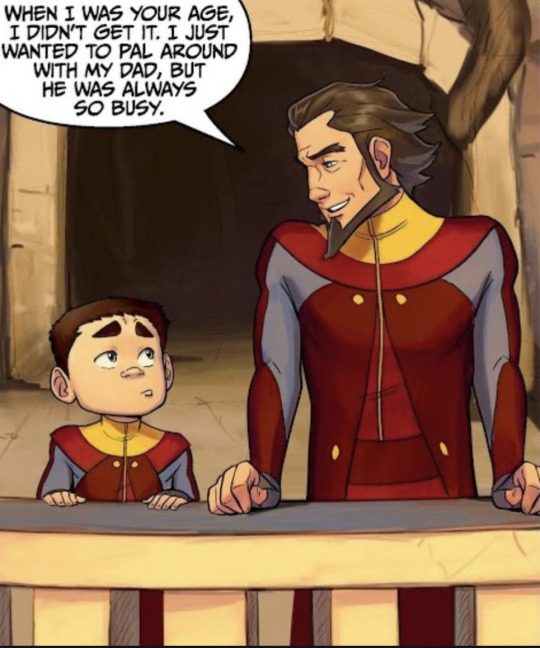
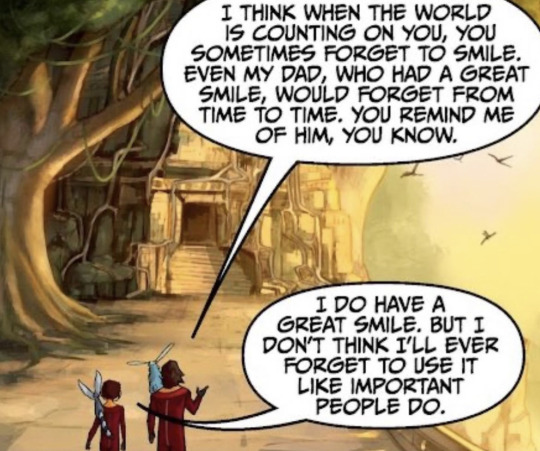
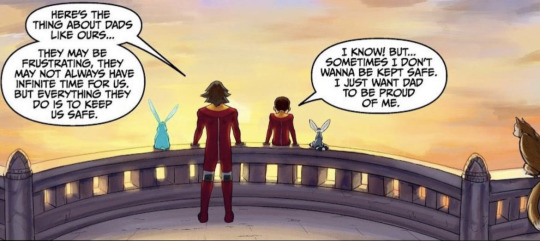

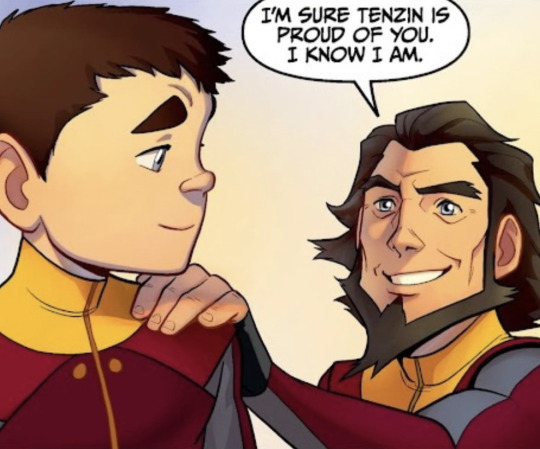
to answer your question: if you were to only watch the legend of korra, i can completely see why you’d arrive at the conclusion that aang was a negligent father who deliberately focused on his youngest child over his other non-airbending children. if you factor in print and comic media, it tells the story of a father who was trying his best to balance his responsibilities to the world and his personal life, succeeding in some ways and failing in others. at the end of the day, it seems like kya and bumi’s genuine love for their father overtakes their grievances with him. what’s interesting is that it’s not like an “he’s my father so I’m obligated to love him” type of love. it’s more along the lines of, “yes we have our issues with him but we do believe he loved us wholeheartedly and we want to be included in his legacy.”
now, just because i’ve grasped (after so many attempts) on what bryke was trying to do in korra does not mean that i don’t have my fair share of issues with the way bryke went about writing that storyline. i dislike the fact that they blamed the fandom on the overexaggeration - if all sides of the fandom came out with the take home message that aang was a deadbeat father who gatekept his culture to his literal family, the onus is on your writing, not on the fandom. the balanced perspective years later in the comics is appreciated, but we definitely needed to see this in the show from the get go.
ultimately, if they have an interest in redeeming aang’s arc as a father (which i suspect they might want to do given post-korra material), they need to show us, rather than just tell us, that he wasn’t as bad as how korra makes him out to be. the perfect opportunity for this is in this upcoming adult gaang movie with the birth of baby bumi. we have no details surrounding this adult gaang movie, so i don’t know if bumi will be in it or not. but it is the perfect opportunity, if bryke are interested in going that route.
I will end off by saying that i’d rather have aang as a father than my own any day lmaooo.
126 notes
·
View notes